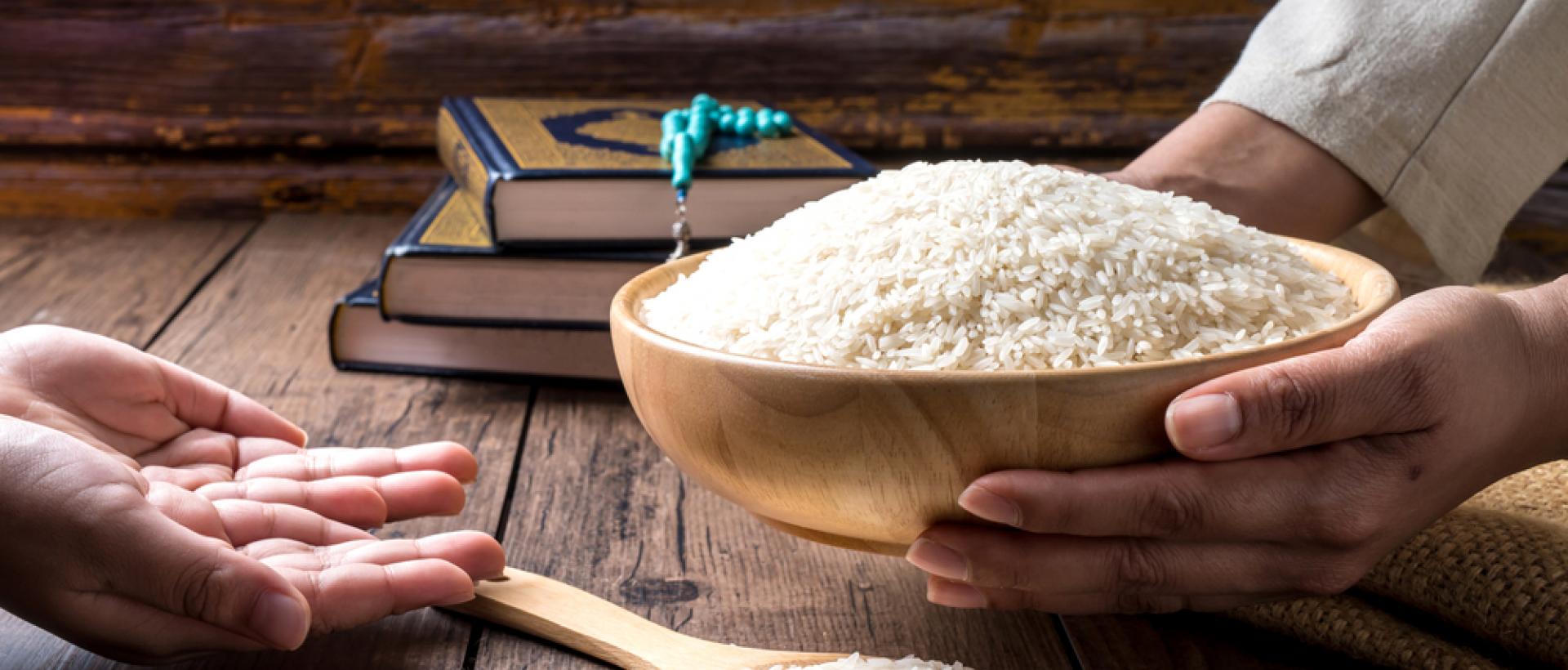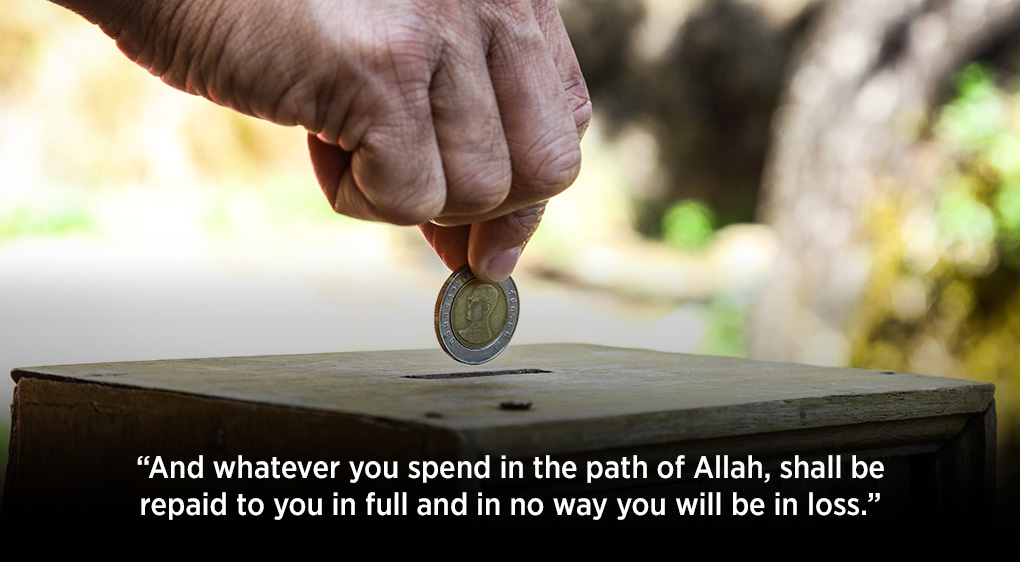
Posted: April 19 2023
WHAT’S THE DIFFERENCE BETWEEN ZAKAT AND
SADAQAH?
Sadaqah, meaning ‘righteousness’, refers to charity, and this form of voluntary charity should be given regularly. It should be given purely with the intention of pleasing Allah (SWT). Sadaqah is mentioned in more than 50 places in the Qur’an, and this virtuous act has a lot of benefits for the giver and helps the receiver.
Sadaqah is a means of protecting yourself from calamities, protection from hellfire, and the reason for the shade covering you on the Day of Judgement, as well as having many other benefits.
The reward of Sadaqah is high, even for small amounts, such as a few pounds. Ultimately, as with every act for Muslims, it is rewarded by your intentions, so even if you cannot donate a lot, a little can be highly rewarded.
Even your character can be counted as a good charitable deed if your character means you are generous and giving. In addition, smiling is a charitable deed, and this is also Sunnah, as the Prophet Muhammad (PBUH) used to smile often.
Gate to Jannah – Baab As-Sadaqah
Baab As-Sadaqah, meaning Door of Sadaqah (charity), is a gate through which Muslims can enter Heaven, Jannah. However, those who can enter through this gate must have been generous and willingly given their wealth to those in need and performed many acts of charity. To enter through this gate, it is important to give charity regularly, for some of the most loved acts of worship by Allah (SWT) are those done regularly, no matter how small.
Islamic Quotes About Sadaqah
There are many quotes about Sadaqah, including hadiths, which should encourage us to strive to give more charity as Muslims. Here are some very important ones:
Charity is due every day – “A charity is due for every joint in each person on every day the sun comes up: to act justly between two people is a charity; to help a man with his mount, lifting him onto it or hoisting up his belongings onto it, is a charity; a good word is a charity; and removing a harmful thing from the road is a charity.” (Al-Bukhari, Muslim)
Charity is shade on the Day of Resurrection – The Prophet, upon him, be peace, said: “The believer’s shade on the Day of Resurrection will be his charity.” (Al-Tirmidhi)
Charity prevents hardship – The Prophet, upon him, be peace, said: “Give charity without delay, for it stands in the way of calamity.” (Al-Tirmidhi)
Charity should be given for the sake of Allah (SWT) and should be kept private as an act of worship between you and Allah (SWT) – The Prophet, upon him, be peace, said: “A crafty one, a miser, and one who keeps reminding people of what he has given, will not enter Paradise.” (Tirmidhi)
Sadaqah Jariyah
There are many acts of charity that count as Sadaqah Jariyah – a charity with ongoing rewards. For example:
- Giving a Qur’an to someone – every time they read from it, you will gain the reward.
- Passing on knowledge about the Deen – this cycle allows many people to be rewarded for sharing and teaching this knowledge.
- Donating to build a masjid – for every person who prays in there, you will also get the reward.
- Donating a wheelchair to a hospital or care home – for every person who uses it, you get the reward.
- Building a water well – for every person or animal who drinks from it, you get the reward for it.
Quotes About Sadaqah Jariyah
Muhammad, upon him, be peace, said: “When a man dies, his deeds come to an end except for three things: Sadaqah Jariyah (ceaseless charity); a knowledge which is beneficial, or a virtuous descendant who prays for him (for the deceased).” (Muslim)
As seen in this hadith, even when a person dies and can no longer worship Allah (SWT), they can still gain good deeds by having done acts of Sadaqah Jariyah while they are alive. Equally, if a family pays for a masjid construction or water well and dedicates it to the deceased, then this person can receive rewards through this, too.
A core part of the Muslim faith is giving charity and supporting those in need who are less fortunate. Both Zakat and Sadaqah are based on helping others, although there are key differences between them. Zakat is one of the Five Pillars of Islam and is an obligatory annual payment made to purify all wealth held above the Nisab threshold value. Sadaqah is not at all obligatory; it is simply a kind gesture made with the intention of helping others.
So, what is the difference between Sadaqah and Zakat?
What is Zakat in Islam?
One of the Five Pillars of Islam and officially meaning “that which purifies,” Zakat is an obligatory payment that carries its own set of expectations and requirements. One of which is that you must hold enough wealth to meet the Nisab threshold, a value which is calculated from 87.48 grams of gold or 612.36 grams of silver. The minimum amount of Zakat you must give is 2.5%, but there is no upper limit, and only a specific group of people can receive Zakat contributions, as per the Qur’an. This includes the following:
- The poor
- The hungry
- Those responsible for distributing Zakat
- Those in captivity and slavery
- Those living with unmanageable debt
- Those who fight in the name of Allah (SWT)
- Stranded or struggling travellers
- New Muslims and friends of Muslim communities
Zakat must be given annually, as long as you have held wealth exceeding the Nisab threshold for the previous Islamic calendar year, and when you choose to give it is up to you. Many Muslims choose to give their Zakat during Ramadan and often in the last 10 nights of Ramadan when the rewards are said to be much greater, and it is also when the Night of Power falls.
Zakat is intended to strengthen the Muslim community, the Ummah, by redistributing wealth to the poorest of our society and ensuring they get the resources they need to live.

What is Sadaqah in Islam?
Sadaqah is any voluntary act of righteousness or kindness that is made with no expectation for anything in return. There is no minimum amount of Sadaqah that must be given and no requirement to give regularly. Sadaqah can be split into two further acts of kindness, Sadaqah itself, which is considered a short-term gesture and Sadaqah Jariyah, which is a gesture that gives long-term. There is no requirement to what you need to do to fulfil Sadaqah, meaning that something as simple as sharing your knowledge in Islam can be a gesture that continues to give.
Sadaqah Jariyah (Sadaqah e Jariyah) vs Zakaat (Zakat)
Sadaqah Jariyah differs slightly from Sadaqah. While Sadaqah Jariyah is still a voluntary form of charity like Sadaqah, it must have a lasting impact on the receiver. To that end, examples of Sadaqah Jariyah include planting a resourceful tree, such as fruit trees or contributing towards the building of water wells, schools, or hospitals.
Benefits of Zakat and Sadaqah
Both gestures carry great rewards in this life and the next for the giver, but the effects of Zakat and Sadaqah are even greater for the receiver. The donations made with the intention of Sadaqah or Zakat through Orphans in Need are received by those most in need, our orphans and widows who are struggling in life through no fault of their own. Your Sadaqah and Zakat donations enable us to provide seasonal clothing to keep warm in the cold winters, food packs that will feed hungry mouths for a month and necessary access to education and medical care.
Although there is a difference between Sadaqah and Zakat, they are both ways to help you get closer to Allah (SWT). By practising regular charity, you can improve your own well-being and find peace and happiness in this life and the Hereafter. By giving charity, we also show Allah (SWT) that we are grateful for the gifts he has bought onto our own lives.
Following the Way of the Prophet (PBUH)
Prophet Muhammad (PBUH) is the best example of regular giving and would often give to those in need who had nothing of their own when he himself was hungry. By making regular Sadaqah, you are following in the footsteps of the Prophet (PBUH) and setting a good example in life for your own children.
By understanding the Zakat and Sadaqah differences, you can be better informed when making a donation or contribution to Orphans in Need. We will take your contributions, whether they are intended as Zakat or Sadaqah and use them to improve the lives of hundreds of orphans in countries all over the world.
You can sponsor an orphan today with us for only £30 a month, that’s about £1 a day – not a lot to many of us, but this amount makes a huge difference in the life of needy orphan children.







